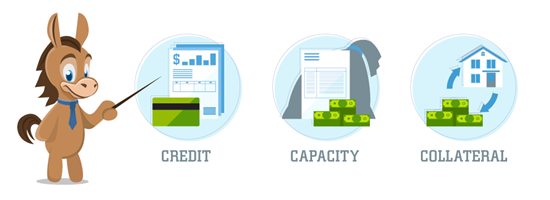What Does an Underwriter Do?
Mortgage underwriting is where key decisions are made in the lending process. The underwriter has the power to approve or decline your loan application. Yet, you never talk to this "mystery person."
 |
| © CreditDonkey |
Mortgage underwriting seems scary, doesn't it? Your loan documents seem to enter an unknown land where you don't hear from anyone until a problem arises. Just what does that underwriter do and how can you make sure your loan gets through the process okay?
Keep reading to learn what an underwriter does and why you should have a little bit of patience as you wait for your answer.
What Does It Mean When Your Mortgage Goes to Underwriting?
The mortgage underwriter has a big job. He has to determine if your job meets the guidelines of your chosen loan program, whether it's FHA, VA, USDA, or conventional.
The underwriter is the next step after your loan officer and loan processor handle your loan file. Once the processor believes you have provided all necessary documents for your loan approval, he/she will send the package to the underwriter.
Typically, the underwriter works in-house with the mortgage lender or bank. In some cases, the job may be outsourced to a third party. The underwriter takes the provided documents and determines their accuracy. He/she also makes sure the figures you provided match the amount on the documents (more on that below).
Even though you provide the underwriter with pay stubs, asset statements, and even tax documents, he/she will also confirm your employment and asset information with your employer and bank respectively. In other words, the underwriter will thoroughly evaluate any information and documents you provided. The bank/lender wants to know beyond a reasonable doubt that every piece of information you provided is truthful.
What Risks Does the Underwriter Measure?
The underwriter's main job is to assess your risk. In other words, how likely are you to be able to make your mortgage payments now and in the future? Of course, no one has the ability to predict the future, but underwriters can take a good guess on how well you can afford the loan based on the information you provide.
Underwriters assess your risk on what's called the "3 C's":
- Credit: Your credit is one of the main factors in your loan eligibility. Not only do underwriters look at your credit score, they also look at your credit history. They want to see if you paid your bills on time, if you overextended yourself financially, and the frequency with which you opened new credit (credit cards, personal loans, or even auto loans). They use this information to determine your ability to take on a new debt as large as a mortgage.
- Capacity: Do you have the money to pay the mortgage? Do you have "extra" money on hand to serve as reserves? Lenders measure your capacity by looking at your current pay stubs, your W-2s for the last two years, and your bank statements for the last few months. These documents tell a lender how much you make now as well as how your income has changed over the last two years. It also tells the lender how well you save money and if you have the means to pay for the mortgage payment and still have money left to cover other bills and/or savings.
- Collateral: You don't have a lot of control over the collateral, but it plays an important role. The underwriter will require an appraisal from a professional appraiser to determine the value of the home. The underwriter then compares this value to the loan amount. He/she must ensure that the loan-to-value ratio doesn't exceed the program guidelines. The underwriter will also make sure the type of property is acceptable for the program. For example, if you buy a condo, you may have fewer financing options, as some programs have stricter requirements for condos.
If you buy a condo, you'll want to check with your lender to see if you can use the desired loan program. For example, the FHA, USDA, and VA allow condo purchases, but only if they have already approved the development. These government entities want to make sure the development is a good risk because when you buy a condo, you buy into shared property with others. You only own the interior of the condo—you share everything else. If the development is in legal trouble or one owner owns many of the units, the FHA, USDA, and/or VA may not allow financing on the condos.
What Documents Does a Mortgage Underwriter Need?
In order for the underwriter to properly process your loan, he/she will need a variety of documents from you. Each lender and/or loan program may differ (need additional documents), but in general, you should provide:
- Pay stubs: You should provide pay stubs covering the last 30 days of employment. If you receive pay weekly, provide four pay stubs. If you receive bi-weekly pay, provide two pay stubs.
- W-2s: Gather up all W-2s you received for the last two years. Make sure you include every job you had during that time so that your income adds up accordingly.
- Tax returns: Not every borrower needs to provide tax returns. Typically, you only need them if you are self-employed or you earn more than 25% of your income on commission. If the underwriter has reason to believe that you have unreimbursed employee expenses due to the nature of your job, he/she may ask for tax returns in this case too.
- Asset statements: You'll need a minimum of the last two months' worth of bank statements for the underwriter. This includes any bank statements (checking, savings), investment statements, or any other assets you plan to use for your down payment, closing costs, or to prove that you have as reserves.
As we said above, this is the least amount of paperwork you'll provide the underwriter. As he/she goes through your loan, other questions may come up, which may prompt the need for further documentation.
If you have any special circumstances, such as a gap in employment, large deposit in your bank account, or a hiccup in your credit history, you'll want to prepare a Letter of Explanation. This letter is your time to let the underwriter know why your special circumstance occurred and what you did to overcome the issue. Any documentation you can provide to prove your statements will only help your case as well. Having the letter ready, or at least preparing yourself with the right information to write in the letter, can help speed the process along.
What Decisions Does the Underwriter Make?
After an underwriter evaluates the documents provided, he/she will provide one of the following decisions:
- Approved: This really means "approved with conditions." It's rare that a borrower gets a final approval without submitting further documentation. The conditions in the approval generally have to do with the home itself, such as the appraisal or title work. They may also contain conditions that pertain to your financial worth too. For example, the underwriter may need to perform a verbal Verification of Employment to confirm your dates of employment and income. He/she may also want clarification on an item on a pay stub or your asset statement. The "approved with conditions" status is as close as it gets to a final approval, though.
- Suspended: If you don't provide complete information, as we discussed above, the underwriter may suspend your loan file. This doesn't mean you can't get the loan. It means that the underwriter needs further documentation to make a decision on the eligibility of your application.
- Denied: This one goes without saying. If an underwriter denies your application, it means you aren't eligible for that particular loan. It doesn't mean you can't get any loan. You just may have to reapply for a different loan or find a different lender.
Can an Underwriter Deny a Mortgage Loan?
Contrary to what many borrowers think, even if you have a pre-approved loan, the underwriter can deny your loan application.
Many factors can change between the time you received your pre-approval and when your loan goes to underwriting. An underwriter doesn't see your loan until you have selected a home and signed a purchase contract. If many months passed between the two occurrences, your credit score could have changed, you may have made a large withdrawal from your bank account, or you may have even changed jobs.
It's the underwriter's job to verify beyond a doubt everything you stated on your loan application. If something is amiss, even after the loan officer pre-approved your loan, the underwriter may have no choice but to deny your loan application or at least suspend it until you can rectify the situation.
USDA loans are unique. Not only does the underwriter have to evaluate your qualifying factors, the USDA does too. Once the underwriter approves your loan, he/she must send a complete package to the local USDA office for final approval. This usually adds two to three weeks to the traditional underwriting turnaround time.
How Can You Speed Up the Underwriting Process?
Believe it or not, you play an important role in the underwriting process. Don't think that once you provide the underwriter with your documents that your job is done. It's far from over. Typically, the underwriter reviews the initial documents and then asks for further documentation.
It works like the game of "telephone" you may have played as a kid. The underwriter tells the loan processor, who tells the loan officer, who calls you. That's a long chain of command the message needs to get through. By the time it gets to you, some time has passed. You have to get on the horse and get your documents to the lender as quickly as possible.
The longer you take to provide the necessary documents, the more you delay the loan process. The underwriter can't do anything with your loan until you clear up the issue he found. After you get him/her the documentation, it could take him/her another couple of days to a week or so to get to your loan file, depending on his workload. The faster you respond to his needs, the faster you'll get the answer to your loan application.
Bottom Line
The underwriter plays a vital role in your loan process. Even though you probably won't see or talk to this person, they hold your ability to purchase a home in their hands. The quicker your respond to his/her requests and the more information that you provide upfront, the faster you'll receive an answer on your request.
Write to Kim P at feedback@creditdonkey.com. Follow us on Twitter and Facebook for our latest posts.
Read Next:






